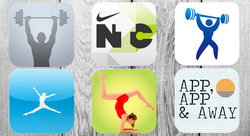
According to AppBrain there are currently over 600,000 different apps that are available for download to a smart phone. Of those apps 1,500(number form the Pew Research Center 2011) are fitness apps that are available on ITunes. Even though the number of fitness apps compared to the overall amount seems quite small, this number is still a staggering amount. Breaking it down, it means that there are 1,500 different individuals that feel that their app is the best way to get fit and don’t forget that is 1,500 different opinions each app is providing as well. This can become overwhelming for a consumer to search and find an option that works for them. Once they find one that they believe fits them best, will the app actually work?
According to a study conducted by BYU, 127 most the most popular fitness apps were rated on a points scale from 1 to 100. From this study they found that the overwhelming majority of the apps were lacking scientific theories for behavioral change. This ultimately misleads the consumer trying to become more fit. Without having a strong scientific base the application is extremely generalized, thus not being able to reach the extreme populations. An example of who falls in this extreme population would be the obese. For many of these individuals their resting metabolic rate plays a vital role in losing weight. If a dietician, doctor, exercise physiologist, and in this case an app, does not know the resting metabolic measurement the approach for this patient is all guessing, thus leaving hope in solely that cutting an amount of caloric intake will be enough. This is essentially what is happening with the generic health apps that are overflowing on the virtual market. In no way am I saying that health apps are bad for an individual. They are still able to be used as a motivator for individuals. The point is that to what extent will the apps actually aid and motivate other users? Will these apps actually be able to aid in becoming more fit even to the extent of curing obesity? These are all relevant questions to be asked. The main focus is to just get society moving for some time throughout the day. If these apps do that in even the slightest fashion I see it as a true success story.
Noah E.
 RSS Feed
RSS Feed